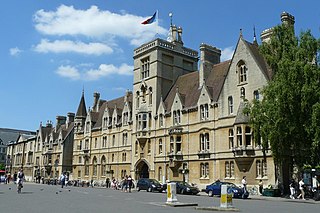Related Research Articles

Trinity College is a constituent college of the University of Cambridge. The college was founded in 1546 by King Henry VIII. Trinity is one of the oldest and largest colleges in Cambridge, with the largest financial endowment of any college at either Cambridge or Oxford. Trinity has some of the most distinctive architecture within Cambridge, with its Great Court reputed to be the largest enclosed courtyard in Europe. Academically, Trinity performs exceptionally as measured by the Tompkins Table, coming in first from 2011 to 2017, with 42.5% of undergraduates obtaining a first class result in 2019.

Balliol College is one of the constituent colleges of the University of Oxford in England. One of Oxford's oldest colleges, it was founded around 1263 by John I de Balliol, a rich landowner from Barnard Castle in County Durham, who provided the foundation and endowment for the college. When de Balliol died in 1268 his widow, Dervorguilla, a woman whose wealth far exceeded that of her husband, continued his work in setting up the college, providing a further endowment and writing the statutes. She is considered a co‑founder of the college.

Trinity College is one of the constituent colleges of the University of Oxford in England. The college was founded in 1555 by Sir Thomas Pope, on land previously occupied by Durham College, home to Benedictine monks from Durham Cathedral.

Zuleika Dobson, full title Zuleika Dobson, or, an Oxford love story, is the only novel by English essayist Max Beerbohm, a satire of undergraduate life at Oxford published in 1911. It includes the famous line "Death cancels all engagements" and presents a corrosive view of Edwardian Oxford.
Ancrene Wisse is an anonymous monastic rule for female anchoresses written in the early 13th century.
Leopold Hamilton Myers was a British novelist.
Frank Owen Dobson was a British artist and sculptor. Dobson began as a painter, and his early work was influenced by cubism, vorticism, and futurism. After World War I, however, he turned increasingly toward sculpture in a more or less realist style. Throughout the 1920s and the early 1930s he built a reputation as an outstanding sculptor and was among the first in Britain to prefer direct carving of the material rather than modelling a maquette first. The simplified forms and flowing lines of much of his sculptures, particularly his female nudes, showed the influence of African art. From 1946 to 1953 Dobson was Professor of Sculpture at the Royal College of Art. He was elected to the Royal Academy in 1953. While Dobson was one of the most esteemed artists of his time, after his death his reputation declined with the move towards postmodernism and conceptual art. However, in recent years a revival has begun. Dobson is now seen as one of the most important British sculptors of the 20th century.
George Edward Dobson FRS FLS FZS was an Irish zoologist, photographer and army surgeon. He took a special interest in bats, describing many new species, and some species have been named after him.
Gordon Miller Bourne Dobson was a British physicist and meteorologist who did important work on ozone.
The University of Oxford is the setting for numerous works of fiction. Quickly becoming part of the cultural imagination, Oxford was mentioned in fiction as early as 1400 when Chaucer in his Canterbury Tales referred to a "Clerk [student] of Oxenford":
"For him was levere have at his beddes heed/ Twenty bookes, clad in blak or reed,/ of Aristotle and his philosophie/ Than robes riche, or fithele, or gay sautrie".
George William Scott Blair was British chemist noted for his contributions to rheology. In fact he has been called "the first rheologist"
Herbert Edward Douglas Blakiston was an English academic and clergyman who served as President of Trinity College, Oxford, and as Vice-Chancellor of the University of Oxford.

Sir Christopher Martin Dobson was a British chemist, who was the John Humphrey Plummer Professor of Chemical and Structural Biology in the Department of Chemistry at the University of Cambridge, and Master of St John's College, Cambridge.
John Dobson was a former solicitor and unionist politician in Northern Ireland.
Sir Denis William Dobson was a British solicitor, barrister and civil servant who served as Permanent Secretary to the Lord Chancellor's Department and Clerk of the Crown in Chancery from 5 April 1968 to 15 April 1977.
The history of Trinity College, Oxford documents the 450 years from the foundation of Trinity – a collegiate member of the University of Oxford – on 8 March 1554/5. The fourteenth oldest surviving college, it reused and embellished the site of the former Durham College, Oxford. Opening its doors on 30 May 1555, its founder Sir Thomas Pope created it as a Catholic college teaching only theology. It has been co-educational since 1979.
Richard Barrie Dobson was an English historian, who was a leading authority on the legend of Robin Hood as well as a scholar of ecclesiastical and Jewish history. He served as Professor of Medieval History at the University of Cambridge from 1988 to 1999.
William Dobson was an English painter of the 17th century.
William Hawes was an English academic.
John Dobson, DD was Warden of New College, Oxford from 1720 until his death.
References
- ↑ Alumni Oxon
- ↑ Hopkins, Clare (2005), Trinity: 450 years of an Oxford college community (2007 reprint ed.), Oxford, ISBN 978-0-19-951896-8
- ↑ CCEd

